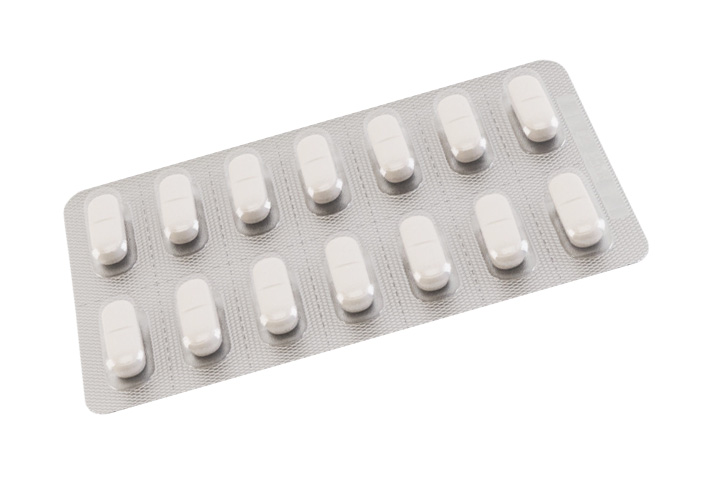Bactrim
Bactrim is a product used to treat infectious diseases caused by bacteria. It contains two active substances: trimethoprim and sulphamethoxazole. Together, they form a medicine that is capable of killing a wide variety of germs responsible for various diseases. This reduces the risk of bacteria 'getting used to' the drug (i.e. developing resistance).
Bactrim is used for the following diseases:
- Infections of the lower and upper respiratory tracts and the ear, such as inflammation of the bronchi, lungs, middle ear and sinuses;
- infections of the kidneys, bladder, urinary tract and sexual organs;
- gastrointestinal infections, such as diarrhoea caused by bacteria, cholera, typhoid and paratyphoid fevers.
What Does Bactrim Contain?

Bactrim tablets are beige/white with a scoreline.
Active ingredients
Bactrim forte, Tablets contain trimethoprim (TM) and sulfamethoxazole (SMZ) as active ingredients.
1 Bactrim forte, Tablet contains 160 mg of TM and 800 mg of SMZ as well as excipients.
Excipients
Carboxymethyl starch sodium (type A), povidone K 30, magnesium stearate, docusate sodium.
Uses
When taking Bactrim, follow your doctor's instructions.
Your doctor will decide how much medicine to take and for how long. You must follow these instructions to the letter. Make sure you drink plenty of fluids during treatment.
Unless otherwise prescribed by your doctor, the following guidelines should be observed:
- Adults and children over 12: 1 tablet of Bactrim forte morning and evening after meals, with plenty of fluid.
- Children under 12: Bactrim forte is not suitable for children under 12.
Depending on the severity of the illness or the characteristics of your case, as well as in the presence of a urinary tract infection, the doctor may follow a different regimen from those shown above.
Treatment with antibiotics should be continued for as long as the doctor has indicated. The symptoms of the disease often disappear before the infection is completely cured. Stopping treatment prematurely may lead to a resurgence of the disease.
Do not change the prescribed dose on your own initiative. Contact your doctor or pharmacist if you feel that the effectiveness of the medicine is too low or, on the contrary, too high.
Side Effects
Taking Bactrim may cause the side effects described below.
Very common (affects more than 1 in 10 users)
- Increase in the concentration of potassium in the blood (with signs such as muscle weakness, tingling in the arms and legs, pasty tongue) (very frequent in patients with pneumonia, existing potassium metabolism disorders or kidney problems and in patients taking medicines that increase potassium levels),
- Decrease in blood sodium levels,
- Loss of appetite,
- Fever, usually associated with rash.
Common (affects 1 to 10 in 100 users)
- Nausea, vomiting,
- Hypersensitivity reactions of varying degrees of severity, such as rash (e.g. with redness, spots, nodules or papules), itchy rash*, scaling, runny nose,
- Increased liver enzyme levels (possibly accompanied by fatigue, loss of appetite, narrowing of the bile ducts and consequent yellowing of the skin or eyes, light-coloured stools and dark urine),
- Increased blood levels of substances eliminated by the urinary tract, such as urea, uric acid or creatinine.
Occasional (occurs in 1 to 10 out of 1000 users)
- Diarrhoea. If you experience severe, persistent diarrhoea or bloody mucus in the stools, consult your doctor immediately. In the event of diarrhoea, you must not take any medicine that inhibits the movements of the intestine (peristalsis),
- Inflammation of the colon,
- Infections caused by fungi (e.g. damage to the mucous membranes, with redness and whitish deposits),
- Convulsions,
- Urticaria,
- Kidney problems (up to and including kidney failure),
- Jaundice, inflammation of the liver (hepatitis).
Rare (affecting 1 to 10 in 10,000 users)
- Blood count abnormalities (reduced number of white blood cells, anaemia, reduced number of platelets with bruising, bleeding from the nose or gums and, depending on the severity, increased bleeding from mucous membranes), anaemia, low blood sugar (especially in patients with kidney or liver problems, undernutrition, or taking high doses of this medicine),
- Hallucinations, delirium and psychosis (especially in elderly patients),
- Non-inflammatory nerve disorders and abnormal sensations (e.g. tingling or numbness in the hands or legs), inflammation of the nerves,
- Inflammation of the oral mucosa, superficial inflammation of the tongue, cessation of bile flow,
- Elimination of crystals in the urine.
Very rare (occurs in less than 1 in 10,000 users)
- Serious life-threatening skin reactions (Stevens-Johnson syndrome, Lyell syndrome, DRESS and acute generalised exanthematous pustulosis), which begin as reddish, rounded patches (often with a blister in the centre) on the trunk, accompanied by open, painful lesions (ulcers) in the mouth, throat, nose and genitals, and redness and swelling of the eyes (conjunctivitis). They are often associated with flu-like symptoms such as headache, fever and body aches,
- Severe allergic reactions of sudden onset, such as fever, facial swelling, swelling of the skin, mucous membranes and tongue, breathing difficulties, fall in blood pressure or even anaphylactic shock. If signs of an allergic reaction appear, you should stop taking Bactrim and consult your doctor immediately,
- Lung hypersensitivity reaction with (more) frequent coughing fits, difficulty breathing and shortness of breath,
- Severe inflammation of the liver/liver necrosis,
- Movement coordination disorders,
- Inflammation of the choroid in the eye,
- Dizziness, ringing in the ears,
- Small spots of haemorrhagic origin on the skin, inflammation of the blood vessels (e.g. small arteries and veins in the subcutaneous tissue),
- Sensitivity of the skin to light,
- Destruction of striated muscle fibres (rhabdomyolysis), sometimes accompanied by muscle pain, weakness, oedema and general symptoms,
- Meningitis or meningitis-like symptoms (with stiff neck, headache, fever and general malaise),
- Inflammation of the heart muscle (allergic myocarditis), heart rhythm disorders,
- Abnormalities of the blood count (significant decrease in the number of white blood cells, manifested by profound general malaise and fever),
- Increased urine output, flank pain (due to inflammatory kidney disease),
- Resting tremor as in Parkinson's disease, sometimes in association with apathy, clonic foot spasms (rhythmic contractions of the calf muscles) and a spread-legged gait,
- Serious mental disorder,
- Inflammation of the pancreas,
- Unknown frequency (cannot be estimated on the basis of available data),
- Inflammation of blood vessels,
- Acute inflammation of the pancreas (manifested by severe stomach pain),
- Joint and muscle pain,
- Inflammation of retinal vessels,
- Bloody sputum due to inflammatory damage to the pulmonary vessels,
- Miscarriage,
- Raised, painful, purplish-coloured skin lesions on the lower limbs, and in some cases on the face and neck, with fever (Sweet's syndrome),
- Kidney stones (urolithiasis).
More frequent or more severe side effects with high doses for the treatment of Pneumocystis jirovecii pneumonia (formerly carinii).
A side effect that may be caused by Bactrim metabolites, especially in the presence of risk factors such as crystalluria or reduced urine output.
If you notice any side effects, please tell your doctor or pharmacist. This applies in particular to side effects not mentioned in this package leaflet.
Precautions
Tell your doctor about all the conditions you have or have recently had. There are patients to whom the product should not be administered in certain circumstances or in whom the doctor must be particularly careful when giving Bactrim.
Tell your doctor:
- if you suffer from allergies and/or asthma;
- if you suffer from an unexpected worsening of cough and shortness of breath;
- if you have mild impairment of liver or kidney function;
- if you have thyroid problems;
- if you have a possible folic acid deficiency;
- if you are pregnant or planning to become pregnant.
Treatment with Bactrim is not recommended if you are pregnant or planning to become pregnant. Your doctor will carefully assess the benefit and risk of treatment with Bactrim because the active ingredients contained in Bactrim cross the placental barrier, affect the metabolism of folic acid in the unborn child and may therefore represent a potential risk to the unborn child, and an increased risk of spontaneous abortion has been observed in clinical studies.
If you are planning a pregnancy, you should carry out a pregnancy test and exclude the possibility of pregnancy before starting treatment with Bactrim.
Caution should also be exercised when taking Bactrim if you are elderly.
You should stop taking Bactrim immediately and consult your doctor as soon as possible:
- if you develop a skin rash and/or any of the other symptoms described here. The rash begins as reddish, cocooned or rounded patches, often with a bulla (blister) in the centre, on the trunk. Over time, blisters may form or the skin may peel off over a large area. Other signs include ulcerations (open, painful lesions) in the mouth, throat, nose and genitals, as well as red, swollen eyes. These skin reactions are often accompanied by flu-like symptoms such as headache, fever and body aches, and swollen lymph nodes. These are signs of serious, life-threatening skin reactions (Stevens-Johnson syndrome, Lyell syndrome or DRESS or acute generalised exanthematous pustulosis (AGEP)), i.e. a reaction to a drug, with rash and other physical symptoms;
- if flu-like symptoms, throat inflammation or fever occur. These may be signs of blood abnormalities that require an immediate check of the blood count;
- if consciousness is impaired, as this may be a sign of serious liver damage;
- if more severe coughing fits with shortness of breath occur (suggestive of a pulmonary hypersensitivity reaction);
- if breathing difficulties, particularly on exertion, and heart rhythm disturbances occur (suggestive of myocarditis, an inflammatory disease of the heart muscle).
In the event of prolonged or repeated treatment in patients over 65 and in patients with folic acid deficiency, the doctor may check the blood count regularly.
This medicine may affect the functioning of your kidneys and lead, among other things, to increased diuresis (increased urine output).
Make sure you drink enough during treatment with Bactrim.
If you require high doses of Bactrim, if you have kidney disease or potassium metabolism disorders, or if you are taking potassium-increasing drugs at the same time, your doctor will monitor your kidney function and blood potassium levels closely.
In the event of severe and persistent diarrhoea, sometimes with bloody mucus in the stools, during or after treatment with Bactrim, consult your doctor immediately, as this may be a sign of serious inflammation of the intestinal wall with ulcer formation, which requires immediate treatment. You should then stop taking Bactrim and your doctor will start appropriate treatment, which should not include any medicines that inhibit intestinal movements (peristalsis), such as those containing loperamide as the active ingredient.
There have been isolated reports of extreme immune responses caused by the unchecked activation of white blood cells, resulting in inflammation (known as haemophagocytic lymphohistiocytosis), which can be life-threatening if not quickly identified and managed. If you notice several symptoms like fever, swollen glands, weakness, dizziness, difficulty breathing, bruising, or a skin rash occurring at once or in quick succession, it is crucial to seek medical advice immediately.
Taking Bactrim at the same time as other medicines Bactrim may affect the action of other medicines taken at the same time.
As Bactrim may reduce the effectiveness of oral contraceptives ("pill"), patients undergoing treatment with Bactrim should take additional measures to prevent pregnancy.
Blood sugar levels should be monitored in patients receiving Bactrim and hypoglycaemic drugs at the same time, as this combination may influence the dose of hypoglycaemic drugs required.
Tell your doctor if you are taking any of the following medicines:
- diuretics (medicines that promote urine secretion)
- digoxin (for the treatment of heart disease)
- amiodarone (for heart rhythm disorders)
- preparations that inhibit blood clotting (anticoagulants)
- phenytoin (for the treatment of epilepsy)
- clozapine (for the treatment of mental illness)
- methotrexate (for the treatment of cancer, psoriasis and rheumatoid arthritis)
- paclitaxel (for the treatment of cancer)
- oral antidiabetics, such as glibenclamide, repaglinide and pioglitazone
- pyrimethamine (e.g. for malaria and toxoplasmosis)
- amantadine (anti-parkinsonian drug/antiviral (flu) drug)
- memantine (for the treatment of dementia)
- dofetilide (anti-arrhythmic drug for the treatment of chronic atrial fibrillation)
- lamivudine (drug for the treatment of HIV infections)
- nucleoside analogues (a class of drugs used to treat viral diseases)
- ciclosporin, tacrolimus or azathioprine (drugs that suppress the body's defence reactions)
- mercaptopurine (for the treatment of leukaemia and chronic intestinal inflammation)
- dapsone (for infectious diseases)
- certain medicines for high blood pressure (ACE inhibitors and angiotensin receptor blockers)
- prednisolone (for acute inflammatory reactions).
Bactrim has no direct influence on the ability to drive or use machines. However, it may cause undesirable effects (e.g. convulsions, dizziness or inflammation of the eye) which may compromise this ability, sometimes seriously.
This medication contains less than 1 mmol (23 mg) of sodium per maximum daily dose, essentially making it "sodium-free."
Please tell your doctor or pharmacist if you:
- you suffer from any other illness
- you have any allergies
- are already taking other medicines (or using other medicines externally) (even if you are self-medicating!).
What else do you need to consider?
The combination of active ingredients contained in Bactrim does not act against all the micro-organisms responsible for infectious diseases. Using the wrong antibiotic or the wrong dose can lead to complications. Never use Bactrim on your own initiative to treat other illnesses or other people.
When should Bactrim not be used?
You must not use this product:
- if you know that you are hypersensitive to one or more of the active ingredients, to other sulphonamides or to any of the excipients contained in Bactrim.
- if you have ever had a serious skin reaction after taking the active ingredients contained in Bactrim.
Bactrim must not be administered to:
- patients with severe liver or kidney disease, or certain pathological abnormalities of the blood count;
- patients with congenital glucose-6-phosphate dehydrogenase deficiency (a disorder of the red blood cells), haemoglobin abnormalities or acute porphyria (a rare metabolic disorder);
- premature babies and newborns under six weeks old;
- newborns with hyperbilirubinemia or glucose-6-phosphate dehydrogenase deficiency of red blood cells;
- pregnant women in their third trimester (last three months of pregnancy).
Simultaneous administration of dofetilide (an anti-arrhythmic drug used to treat chronic atrial fibrillation; not authorised in Switzerland) is contraindicated.
Pregnancy and Breastfeeding
Treatment with Bactrim is not recommended if you are pregnant or planning to become pregnant. Your doctor will carefully assess the benefit and risk of treatment with Bactrim because the active ingredients contained in Bactrim cross the placental barrier, affect the metabolism of folic acid in the unborn child and may therefore represent a potential risk for the unborn child, and an increased risk of miscarriage has been observed in clinical studies.
If you are planning a pregnancy, you should carry out a pregnancy test and exclude the possibility of pregnancy before starting treatment with Bactrim.
Pregnant women should not take Bactrim during the last three months of pregnancy.
If you are pregnant or intend to become pregnant, or if you are breast-feeding, you should only take Bactrim after talking to your doctor or pharmacist.
Upper Respiratory Tract Infections
Upper respiratory tract infections (URTIs) are acute conditions caused mainly by viruses or, more rarely, bacteria, affecting the nose, paranasal sinuses, pharynx, larynx and middle ear.
URTIs are the most frequent reason for outpatient consultations, and in adults they are divided between pharyngitis (25%), rhinosinusitis (25%) and non-specific infections (33%).



